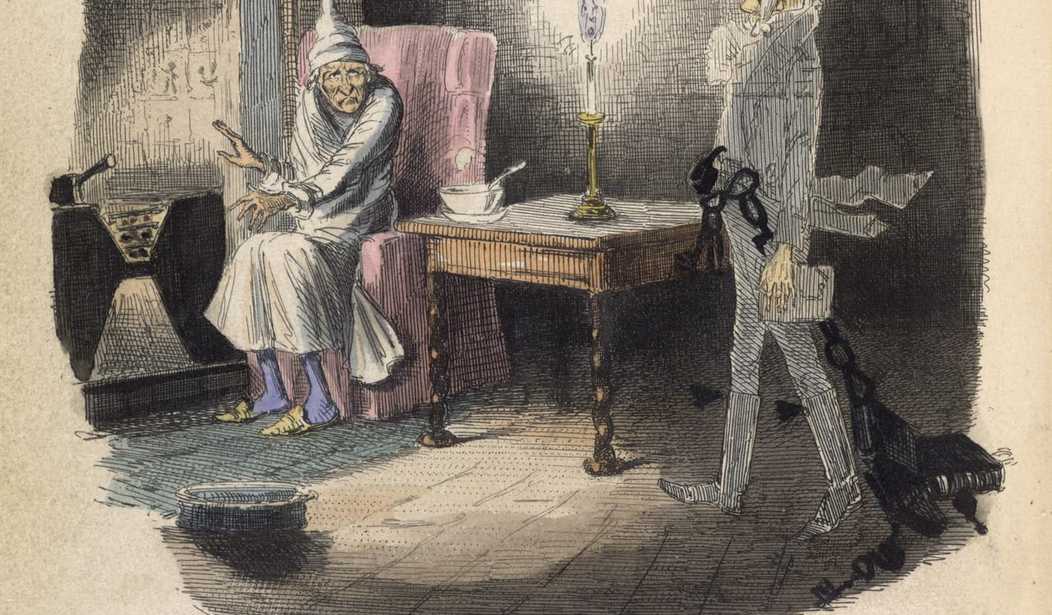I love A Christmas Carol in all its forms, whether Scrooge is played by Jim Carrey or Kelsey Grammer, Michael Caine or McDuck. I also love the original book by Charles Dickens. The timeless story serves to chastise us for our greed, selfishness, and lack of care for our neighbor. It’s an enduring theme that resonates with all people of good will and common sense.
I recently shared a cup of Christmas coffee to catch up with a friend and made an offhand comment about how our family watched A Christmas Carol together. I was stunned by what happened next.
***
ME: I love this time of year. We just watched Mickey’s Christmas Carol with the kids. It’s amazing how well Dickens’ tale holds up in all its forms.
FRIEND: I can’t believe you like that. It boggles my mind that a story about a rich, white, European cisgender male has become so mindlessly adored by our supposedly enlightened culture.
ME: Ok. What is happening?
FRIEND: The book doesn’t even begin to pass the Bechdel test, and at every turn sends all the wrong messages. Surely you see that.
ME: I can’t say that I do. Can you give me some examples? I certainly don’t want to offend anyone!
FRIEND: Well, the first and most obvious example of its skewed focus comes from the book’s title itself: A Christmas Carol. This is clearly insensitive and the story would have a far wider appeal if it were simply titled A Holiday Carol or even better: A Winter Song.
ME: Hmm. Somehow that doesn’t have the same ring to it.
FRIEND: The next, and more problematic issue comes when Mr. Scrooge is speaking to the two men collecting money for the poor. This scene seems innocent and even mildly progressive on the surface, but then Scrooge asks whether there weren’t still prisons and union workhouses where the indigent could find lodging. This part made me so mad I memorized it to recite whenever it comes up. It reads,
“Many can’t go there; and many would rather die.”
“If they would rather die,” said Scrooge, “they had better do it, and decrease the surplus population.”
ME: Oh, yeah that is pretty tough to read. But Dickens is using that to show how evil Scrooge has become.
FRIEND: Exactly! That’s my problem with it. Dickens is trying to establish Scrooge as a hard-hearted miser but in doing so needlessly paints the entire concept of population control with that same broad brush! Any self-respecting activist knows that the global warming debate is over and that the most humane way to avert the impending catastrophe is to have less humans on the earth! Far from being miserly, Scrooge’s comments should have been presented as remarkably loving and forward thinking.
ME: Oh wow. I don’t know what to say. Please tell me you at least like the ghosts.
FRIEND: I hate to say it, but the ghosts themselves are also very problematic.
ME: Here we go.
FRIEND: The issues begin with the appearance of Jacob Marley. What message is this story sending to our young girls when they read that two men were business partners? So typical. When women are not shown in positions of power our patriarchal society is perpetuated. Dickens could have easily penned the part for a shrewd businesswoman named Jane Marley. Representation is important.
ME: Even as a doomed spirit?
FRIEND: Especially as a doomed spirit.
ME: What about The Ghost of Christmas Past? He’s a benevolent spirit helping to soften Ebenezer’s heart by showing him glimpses of his youth.
FRIEND: The Ghost of Christmas Past gets no pass! Dickens’ hyper-focus on Scrooge’s own past is misguided at best. By taking Scrooge back to his quaint boarding school market-town with “its bridge, its church, its winding river” Dickens only shows that Scrooge was ill-equipped to be an advocate for the underprivileged. Even on his best day how could a man so accustomed to the revelries of Fezziwig ever understand the plight of London’s poor?
ME: Well, I must admit. I’ve never thought of it that way. Ever. What about The Ghost of Christmas Present? He’s jolly. He’s surrounded by great food and he shows Scrooge how his actions are killing Tiny Tim! Surely you agree that this is a great Ghost!
FRIEND: The Ghost of Christmas Present is the very avatar of toxic masculinity! I feel triggered even talking about him. Dickens presents this Spirit as an alarmingly confident, shirtless giant with a broad chest and even “capacious” or large…hands! This Ghost, when not sitting on his couch in a robe sees nothing wrong with peering into the windows of homes… in the present! This Spirit’s presence in the story does nothing more than propagate our culture’s negative stereotypes about what it means to be a “real man.”
ME: Do you find my masculinity triggering?
FRIEND: Oh no. You’re fine.
ME: Thanks. I think. Dare I even ask about The Ghost of Christmas Future?
FRIEND: While certainly not as patently offensive as his predecessor, The Ghost of Christmas Future does nothing more than play on Scrooge’s basest instincts of egoism and self-preservation by showing him a world in which he is disrespected and deceased. Oh, so now Scrooge wants to change!
ME: I see. But you’ve got to admit it was pretty great when Scrooge sends that turkey to the Cratchit’s for Christmas.
FRIEND: See, even that doesn’t satisfy. In what Dickens intends to be the moral culmination of the story Scrooge buys the large “prize Turkey” for the Cratchit Christmas dinner. This is supposed to be read as a generous gesture from a changed man but vegans and other animal rights activists surely cringe at the unrepentant purchasing and consumption of a fellow creature. Some responsibly sourced chia seeds, edamame and black bean stew would have been more compassionate and nourishing for Tiny Tim.
ME: Ok. Ok. But what about the overall message of kindness, giving, love of neighbor?
FRIEND: Oh, the overall theme of A Christmas Carol leaves much to be desired. Instead of ghosts, government officials should have been sent to Scrooge to collect taxes from this emblem of the one percent and new laws should have been laid down to ensure that Ebenezer’s winter cheer continued well after the ghouls glided off and his fear faded away. But Dickens’ focus on personal responsibility leaves all change up to the fleeting whims of a privileged and well-established miser. Humbug!
[Silence]
ME: Um…you watch This is Us?
FRIEND: Oh yeah. It’s great.
ME: Phew. At least there’s one thing we can all still agree on.
***
I sincerely hope this silly satirical piece was received in the way it was intended, with a wink and a generous dose of good Christmas cheer. It isn’t meant to be pejorative but it is intended to make us think about what we might lose when we are preoccupied with a certain type of political correctness that incessantly looks for something to critique rather than something to cherish. When we lose our common sense we lose our common stories.









Join the conversation as a VIP Member